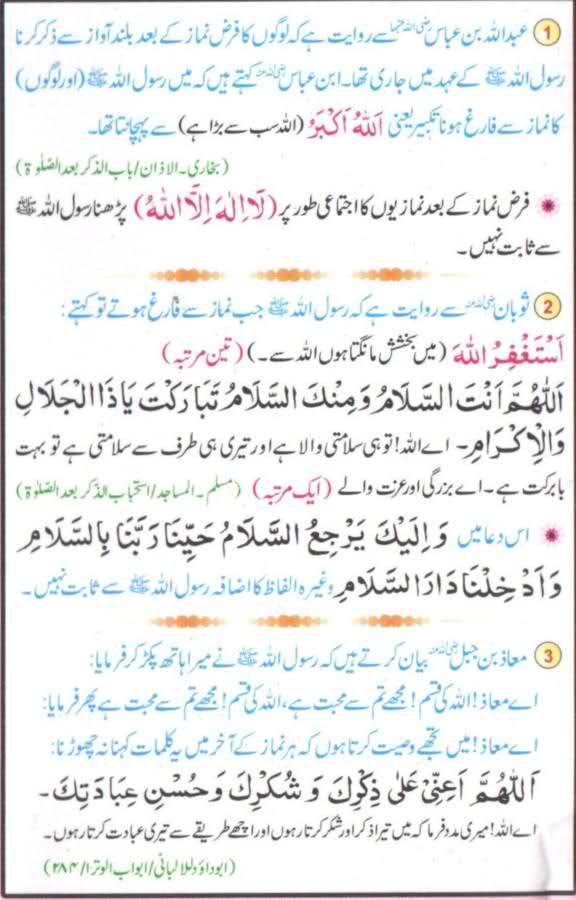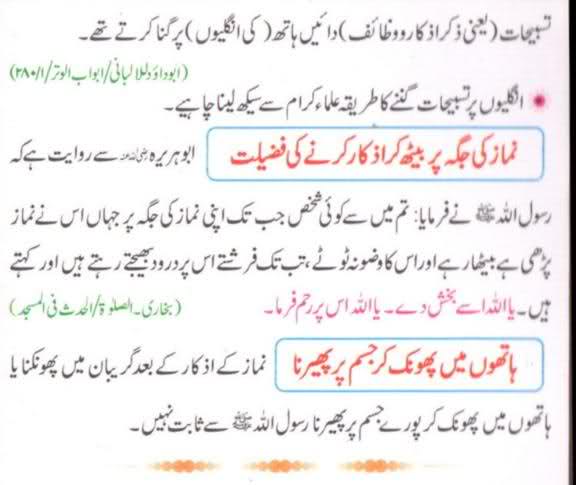What to say after completing salah
Learn to Read Masnoon Dua After Farz Namaz
After saying assalam-o-alaikum by looking at right shoulder & then on left side Then what to say in Arabic. Some necessary dua which Holy prophet (PBUH) used to read after each fard salah. These Duaa’s are based on Qur’an and Sunnah which are recited after every Fard Namaz, Salat, Prayer (Fajr, Zhur, Asr, Maghrib, Isha). Farz namaz ke baad ki dua azkar in Urdu.
Dua:1 Recite ONCE Immediately after Tasleem
Arabic Dua after Namaz:

Pronunciation: Allah-hu Akbar
Translation: Allah is the greatest
Hadith/Benefit: Ibn Abbas (R.A) said, we used to know that Allah’s messenger had finished his prayer when we heard “Allahu Akbar”.
[Reference: Sahih Muslim vol. 1, 1209/1210, Bukhari Vol.1 Book 12/802]
Arabic Dua After Salat:

Pronunciation: Astagfirullah, Astagfirullah, Astagfirullah
Translation: I ask Allah to forgive me
Hadith/Benefit: Ibn Abbas (R.A) said, The Messenger of Allah (S.A.W) said, “If anyone constantly seeks pardon from Allah, Allah will appoint for him a way out of every distress and a relief from every anxiety, and will provide sustenance for him from where he expects not”.
[Reference:Abu Dawud]
Dua:3 Recite ONCE after Fard Prayer

Pronunciation: Alla’humma antas salaam wa min kas salaam taba rakta ya dhal ja laa li wal ik raam
strong>Translation: O’ Allah, You are the Peace, and You are the Source of Peace, You are Blessed, Oh Possessor of Glory and Honor
strong>Hadith/Benefit: On the authority of Aisha (R.A) it is reported that whenever the Messenger of Allah (S.A.W) made the Taslim, he would recite (this Dua).

strong>Pronunciation: Allahumma a’inni ala dhikrika wa shukrika wa husni ibadatika
strong>Translation: O’ Allah Assist me in remembering you, in thanking you, and worshipping you in the best of manners
strong>Hadith/Benefit: One day the Prophet (S.A.W) took Mu’adh Ibn Jabal (R.A) by the hand and said ‘O Mu’adh, by Allah I love you, and I advise you, O Mu’adh, never forget to recite (this Du’a), after every prayer (Fard).
[Reference: Abu Dawud, Book 16, Hadith 1422]

Pronunciation: La ilaha illa allahu wah dahu la shareeka laahu, lahul mulku wa lahul hamdu, wa huwa ‘ala kullee shay’in qadeer, La hawla wa laqu-aata illah billah, la ilaha illAllah wala na’budu illayyah, lahun-ni’matu, wa lahul fadl, wa lahu-saana ul hasanu, la ilaha illAllahhu mukhliseena lahudeen, wa law karihal kafiroon.
Translation: None has the right to be worshipped except Allah, alone, without partner, to Him belongs all sovereignty and praise and He is over all things omnipotent. There is no might nor power except with Allah, none has the right to be worshipped except Allah and we worship none except Him. For Him is all favor, grace, and glorious praise. None has the right to be worshipped except Allah and we are sincere in faith and devotion to Him although the disbelievers detest it
Hadith/Benefit: On the authority of ‘Abdullah bin Az-Zubair (R.A) the Prophet (S.A.W) used to say at the end of the prayer, after making the Taslim.
[Reference: Muslim no. 594]

Pronunciation: Sub-han Allah, Alhamdu lillah, Allah hu Akbar
Laa ilaaha ill-allaahu, waḥdahu laa shareeka lahu, lahul-mulku wa lahul-ḥamdu, wa huwa ‛alaa kulli shay’in qadee
Translation:Glorious is God, Praises are due to Allah, Allah is the greatest
None has the right to be worshipped except Allah, alone, without partner, to Him belongs all sovereignty and praise, and He is over all things omnipotent
Hadith/Benefit
Abu Hurairah (R.A) it is reported from the Messenger of Allah (S.A.W) said whoever follow this Tasweeh, will have his sins forgiven, even if they were like the foam on the sea.
[Reference Muslim no. 597]
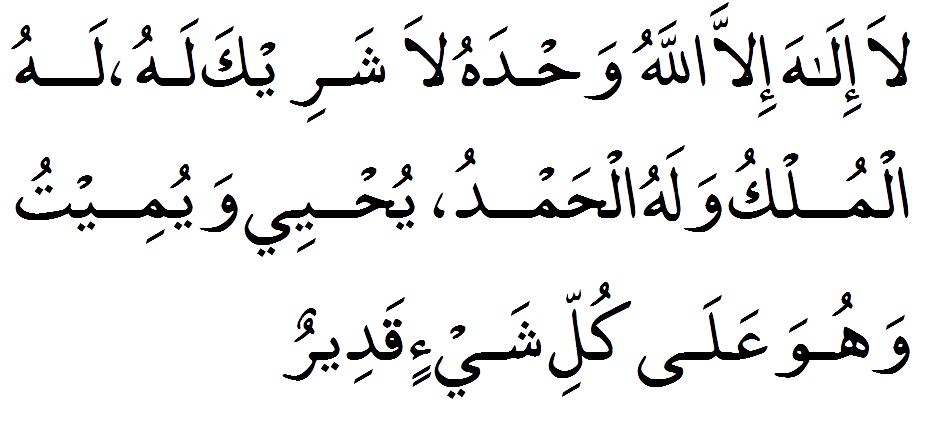
Pronunciation: Laa ilaaha ill-allaahu, waḥdahu laa shareeka lahu, lahul-mulku wa lahul-ḥamdu, yuḥyee wa yumeetu, wa huwa ‛alaa kulli shay’in qadeer
Translation: None has the right to be worshipped except Allah, alone, without partner, to Him belongs all sovereignty and praise, He gives life and causes death and He is over all things omnipotent.
Hadith/Benefit: Whoever says this ten times, will have the reward for freeing four slaves from the Children of Isma’il (A.S).
[Reference: Bukhari 7:67, Muslim 4:2071]

Pronunciation: Allahumma inni aas-aluka ridaka wal jannah, Wa aa’uzhu bika min sakhatika wan-nar.
Translation: Oh Allah! We ask You to be pleased with us, reward us with the Paradise and we seek Your refuge from Your anger and the punishment of the Fire.
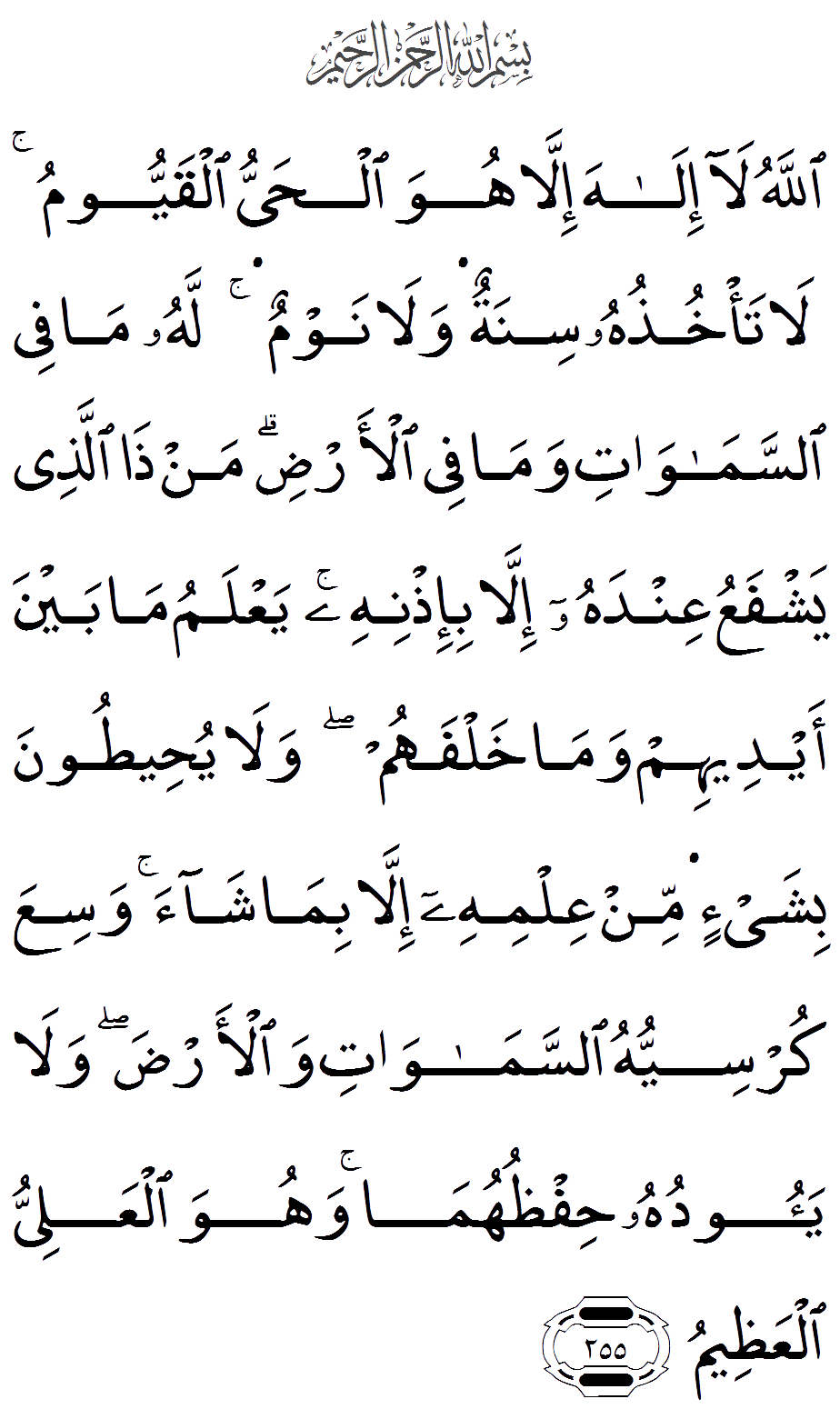
Pronunciation: Allahu la ilaha illahuwa alhayyu alqayyoomu la ta/khuthuhusinatun wala nawmun lahu ma fee assamawatiwama fee al-ardi man tha allatheeyashfaAAu AAindahu illa bi-ithnihi yaAAlamu mabayna aydeehim wama khalfahum wala yuheetoonabishay-in min AAilmihi illa bima shaawasiAAa kursiyyuhu assamawati wal-ardawala yaooduhu hifthuhumawahuwa alAAaliyyu alAAatheem
Translation: Allah – there is no deity except Him, the Ever-Living, the Sustainer of [all] existence. Neither drowsiness overtakes Him nor sleep. To Him belongs whatever is in the heavens and whatever is on the earth. Who is it that can intercede with Him except by His permission? He knows what is [presently] before them and what will be after them, and they encompass not a thing of His knowledge except for what He wills. His Kursi extends over the heavens and the earth, and their preservation tires Him not. And He is the Most High, the Most Great.
Hadith/Benefit
Hadith 1:The Prophet (saw) said “Whoever recites Aayatul Kursi after every Fard Salah, only death is keeping him/her from entering Jannah (As soon as he/she dies, will enter Jannah).
[Nisa’i, Ibne Habban, Ibnelsani A’n Abi Amatah Albahili RA]
Hadith 2: Narrated Abu Huraira (r.a) Allah ‘s Apostle ordered me to guard the Zakat revenue of Ramadan. Then somebody came to me and started stealing of the foodstuff. I caught him and said, “I will take you to Allah’s Messenger (saw)” Then Abu Huraira (r.a) described the whole narration and said: That person said (to me), “Please don’t take me to Allah’s Messenger (saw) and I will tell you a few words by which Allah will benefit you. When you go to your bed, recite Ayat-al-Kursi, (2.255) for then there will be a guard from Allah who will protect you all night long, and Satan will not be able to come near you till dawn.” When the Prophet (saw) heard the story he said to me, “He who came to you at night, told you the truth although he is a liar; and it was Satan.”
[Sahih al-Bukhari 5010 In-book reference: Book 66, Hadith 32]

Pronunciation
1. Qul huwa Allahu ahad 2. Allahu assamad 3. Lam yalid walam yoolad 4. Walam yakun lahu kufuwan ahad
Translation
1. Say, “He is Allah , [who is] One 2. Allah , the Eternal Refuge 3. He neither begets nor is born 4. Nor is there to Him any equivalent
Hadith/Benefit
Whoever recites (Three Qul) three times in the evening and in the morning will protect you against everything.

Pronunciation
1. Qul aAAoothu birabbi alfalaq 2. Min sharri ma khalaq 3.Wamin sharri ghasiqin ithawaqab 4. Wamin sharri annaffathatifee alAAuqad 5. Wamin sharri hasidin itha hasad
Translation
1. Say, “I seek refuge in the Lord of daybreak 2. From the evil of that which He created 3. And from the evil of darkness when it settles 4. And from the evil of the blowers in knots 5. And from the evil of an envier when he envies
Hadith/Benefit
Whoever recites (Three Qul) three times in the evening and in the morning will protect you against everything.
[Reference: Narrated by al-Tirmidhi, al-Da’waat, 3499, Sunan al-Tirmidhi, no. 2829]

Pronunciation
1. Qul aAAoothu birabbi annas 2. Maliki annas 3. Ilahi annas 4. Min sharri alwaswasi alkhannas 5. Allathee yuwaswisu fee sudoori annas 6. Mina aljinnati wannas
Translation
1.Say, “I seek refuge in the Lord of mankind 2. The Sovereign of mankind 3. The God of mankind 4. From the evil of the retreating whisperer 5. Who whispers [evil] into the breasts of mankind 6. From among the jinn and mankind
Hadith/Benefit
Whoever recites (Three Qul) three times in the evening and in the morning will protect you against everything.
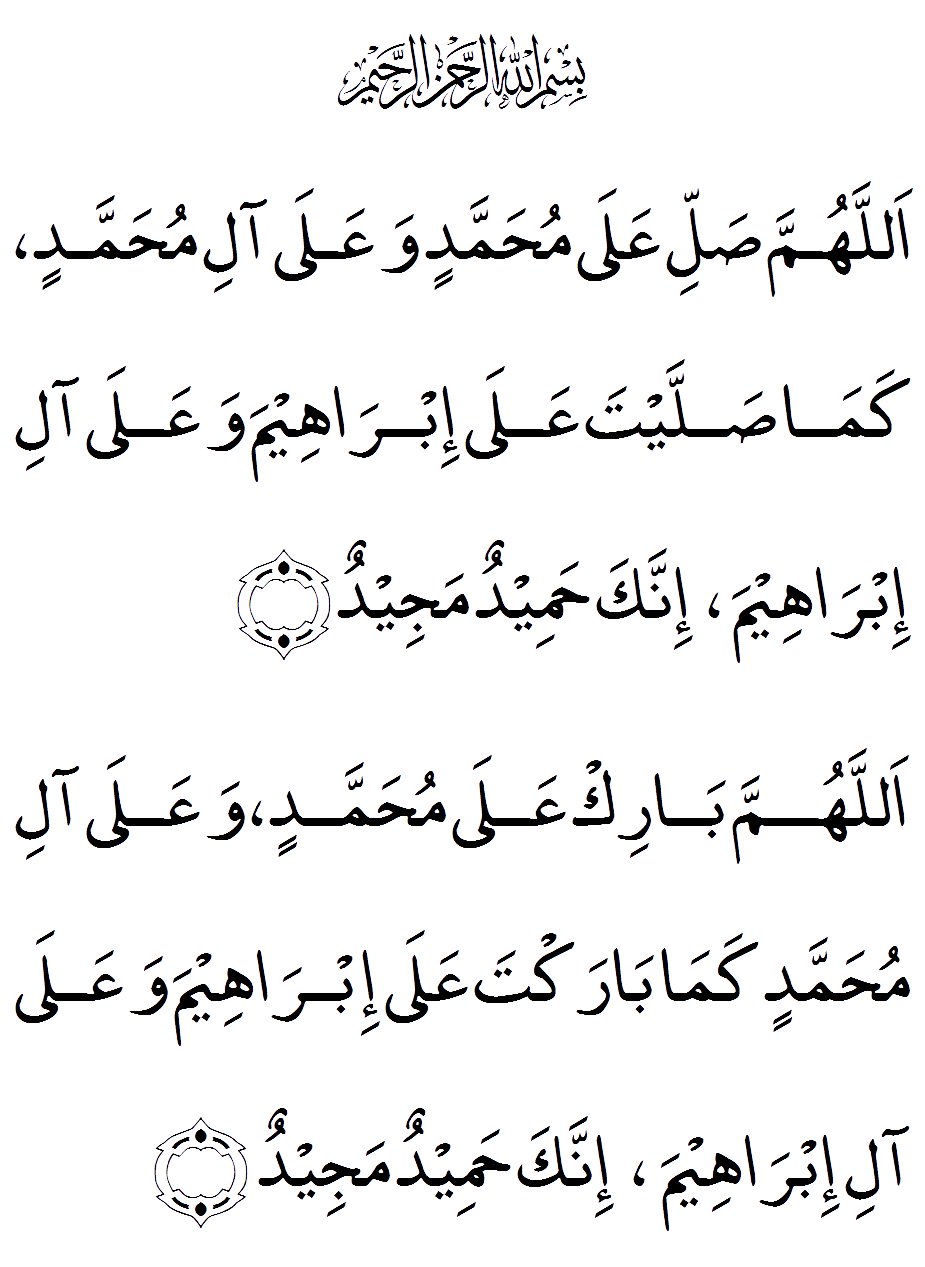
Pronunciation: Allah humma salli ‘ala muhammadin wa’ala ali muhammadin,kama sal’layta ‘ala ibraheema wa’ala ali ibraheema innaka hameedum majeed. Allah humma baraka ‘ala muhammadin wa’ala ali muhammadin, kama barak ta ‘ala ibraheema wa ‘ala ali ibraheema innaka hameedum majeed.
Translation: O Allah, let Your Blessings come upon Muhammad and the family of Muhammad, as you have blessed Ibrahim and his family. Truly, You are Praiseworthy and Glorious.
Hadith/Benefit
Ka’ab bin Ujrah (R.A) narrates that once it was enquired from the Prophet (S.A.W) as to how blessings should be sent to him. The Prophet (S.A.W) replied that “the blessings be said in the manner, that is of Durood-e-Ibrahimi”.
Abu Hurairah (R.A) reported the Messenger of Allah (S.A.W) saying: “He who invokes one blessing upon me, Allah will shower ten blessings upon him”.
Ibn Mas’ood (R.A) reported that the Messenger of Allah (S.A.W) said: “The nearest one to me on the Day of Resurrection will be the one who invoked the most blessings upon me.”
Farz Namaz Ke Baad K Azkar in Urdu Hindi
